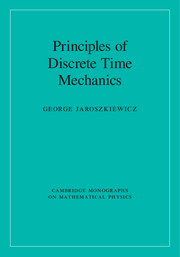Book contents
- Frontmatter
- Contents
- Preface
- Part I Discrete time concepts
- Part II Classical discrete time mechanics
- Part III Discrete time quantum mechanics
- Part IV Discrete time classical field theory
- Part V Discrete time quantum field theory
- Part VI Further developments
- Appendix A Coherent states
- Appendix B The time-dependent oscillator
- Appendix C Quaternions
- Appendix D Quantum registers
- References
- Index
Preface
Published online by Cambridge University Press: 05 May 2014
- Frontmatter
- Contents
- Preface
- Part I Discrete time concepts
- Part II Classical discrete time mechanics
- Part III Discrete time quantum mechanics
- Part IV Discrete time classical field theory
- Part V Discrete time quantum field theory
- Part VI Further developments
- Appendix A Coherent states
- Appendix B The time-dependent oscillator
- Appendix C Quaternions
- Appendix D Quantum registers
- References
- Index
Summary
Long ago, great minds speculated on the nature of time. The following question was asked: could time be divided into ever smaller and smaller pieces, just like a length of wood? We know this for a historical fact, because some of Zeno's paradoxes have survived the ravages of time and these paradoxes discuss precisely this question.
Contrary to what might be believed, interest in Zeno's paradoxes has not been extinguished by the rigours of modern mathematics, although we are taught that it has. Yes, the paradox of Achilles and the tortoise can be explained away in terms of a convergent infinite sum. But the concept of an infinitesimal has not been killed off: far from it, for mathematicians have developed a rigorous, consistent mathematical framework called non-standard analysis that allows for such things.
What I believe this debate about time highlights is how conditioned humans can be. We learn from an early age to think in certain terms and, if we are not careful, we end up regarding them as the only possible framework for our thoughts. So it is with time, which has been regarded as continuous throughout the history of mathematics and physics. It is hard to imagine any physical theory without the concept of a time derivative, and that requires continuity in time.
However, it is the obligation of theorists not only to explore current theories to their natural horizons, but to look beyond those horizons and to step outside of them if that is possible.
Information
- Type
- Chapter
- Information
- Principles of Discrete Time Mechanics , pp. xiii - xivPublisher: Cambridge University PressPrint publication year: 2014
